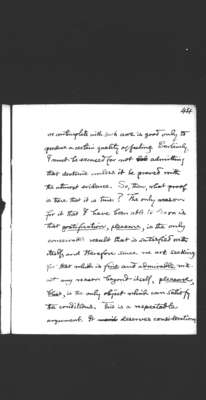Pages
66
41
as good in itself must be accepted without compromise. In deciding ay special question of conduct if is often quite right to allow weight to different conflicting considerations and calculate their resultant. But it is quite different in regard to that which is to be aim of all endeavor. The object admirable that is admirable per se must, no doubt, be general. Every ideal is more or less general. It may be complicated state of things. It may be a complicated state of things. But it must be a single ideal; it must have unity, because it is an idea and unity is essential to every idea and every ideal. Objects of utterly disperate kinds may, no doubt, be admirable, because
67
42
soem special reason may make each one of them so. But when it comes to the ideal of the admirable, in itself, its very nature of its being is to be a precise idea; and if somebody tells me it is either this, or that, or that other, I say to him, it is clear you have no idea of what precisely it is. But an ideal must be capable of being embraced in a unitary idea or it is no ideal at all. Therefore, there can be no compromises between different considerations here. The admirable ideal cannot be too extremely admirable. The more throughly it has whatever character is essential to it, the more admirable it must be.
68
43
Now what would the the doctrine that that which is admirable in itself is a quality of feeling, come to if taken in all its purity and carried to its furthest extreme, - which should be the extreme of admirableness? It would amount to saying that the one ultimately admirable object is the unrestrained gratification of a desire may be. Now that is too shocking. It would be the doctrine that all the higher modes of consciousness with which we are acquainted in ourselves, such as love and reason, are good only so far as they subserve the lowest of all modes to consciousness. It would be the doctrine that this vast universe of Nature which
69
44
we contemplate with such awe is good only to produce a certain quality of feeling. Certainly, I must be excused for not admitting that doctrine unless it be proved with the utmost evidence. So, then, what proof is there that it is true? The only reason for it that I have been able to learn is that gratification, pleasure, is the only conceivable result that is satisfied with itself; and therefore since we are seeking for that which is fine and admirable without any reason beyond itself, pleasure, bliss, in the only object which can satisfy the conditions. This is a respectable argument. It deserves consideration.
70
45
Its premiss, that pleasure is the only concievable result that is perfectly self-satisfied, must be granted. Only in these days of evolutionary ideas which are traceable to the French Revolution as their instigator, and still further back to Galileo's experiment at learning tower of Pisa, and still further back to all the stands that have been made by Luther and even by Robert of Lincoln against attempts to bind down human Reason to any prescriptions fixed in advance, - in these days, I say, when these ideas of progress and growth have themselves grown up so as occupy our minds as they now do, how can we be expected, allow the assumption to pass that the




